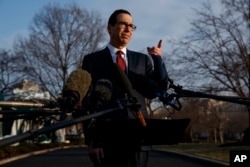High-level talks between the United States and China are set to resume next week in hopes of ending an escalating trade war between the two economic superpowers.
U.S. Treasury Secretary Steve Mnuchin confirmed to reporters Wednesday at the White House that he and Trade Representative Robert Lighthizer are headed to Beijing "with a large team."
Both the Americans and Chinese express a desire to reach an agreement to avert a March 2 deadline imposed by Washington for an increase in U.S. tariffs on Chinese products. If no deal is achieved, tariffs on $200 billion in Chinese goods will increase from 10 percent to 25 percent.
"These are very complicated issues. We're making progress, but there's still a lot of work to do," Mnuchin told reporters.
Talks held last week in Washington among negotiators for the two countries were very productive, according to the treasury secretary.
U.S. President Donald Trump, in his State of the Union address on Tuesday night, said any new trade deal with China "must include real, structural change to end unfair trade practices, reduce our chronic trade deficit and protect American jobs."
Trump previously had indicated he might travel to Beijing to meet with President Xi Jinping to finalize a deal.
"We'll see what progress is made next week," responded Mnuchin when asked Wednesday about that. "There's no plan set at the moment but right now we're focused on next week and making more progress."
The discussions center on demands from Washington for Beijing to make deep structural changes to its economic and trade policies. The United States wants China to reduce subsidies for government-run industries, increase purchases of American agricultural and manufactured products, end forced technology transfers and improve protections for U.S. intellectual property.
There have been reports that aggressive cyber hacking by China also will be added to the agenda of next week's talks.
"We've always talked about cyber issues. This is something we've been consistently talking about with them and the importance of them adhering to the cyber agreements," Mnuchin responded to a question from VOA on this topic. "This is not a new issue. This has been on the agenda."
Trump last Friday said ending the trade war with China could produce the "biggest deal ever made."
If the talks collapse, however, the U.N. Conference on Trade and Development is warning the repercussions will go well beyond the trans-Pacific trading route.
UNCTAD predicts that if the increased tariffs go into effect next month, there will be a downturn in the global economy and instability in commodities and financial markets; however, the European Union would stand to benefit, capturing about $70 billion of U.S.-China bilateral trade, while Japan, Mexico and Canada would each take more than $20 billion.





